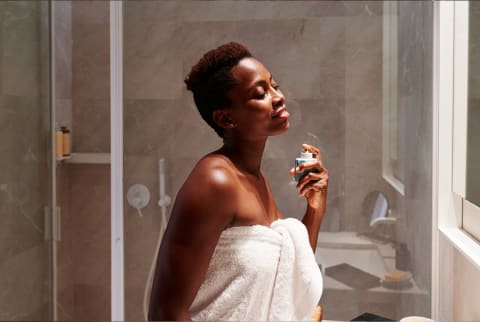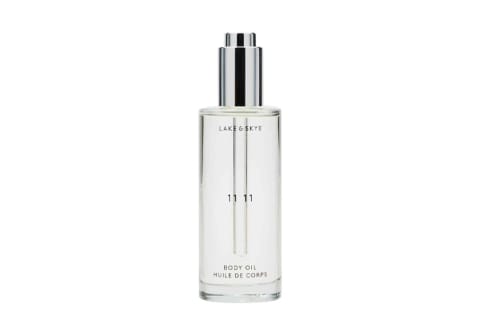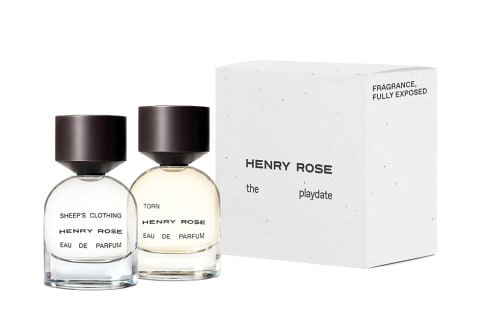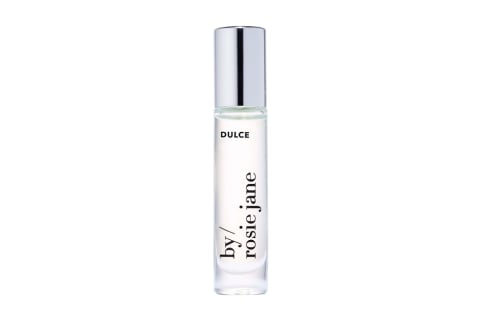Advertisement
9 Ways To Apply Perfume + How To Layer Your Fragrances


Wearable fragrance is one of those things most people are either obsessed with or could go without and never think twice. But for those with a perfume knack, there's more meaning to personal scents than meets the eye—plus, more ways to use them than you might think.
Whether you're a fragrance buff or not, we're here to give you a few more tips so you can get the most out of your fragrance and get creative with your go-to aromas. To come, nine different ways to apply perfume:
How to apply perfume
Here, tips from the pros. But remember, perfume is personal—so apply it in any way that feels best for you.
Apply to skin
The most common way to apply perfume is directly on the skin—after all, it's low-lift, and this method encourages your fragrance to last even longer. However, you don't want to spray it too far away; otherwise, your skin won't catch enough droplets.
"If you want a stronger scent, the closer you apply it, the stronger it will be," founder of clean fragrance brand Lake & Skye Courtney Somer tells mbg. If your fragrance has a lighter scent and you want a stronger impact, then spritz it closer to the skin—about 3 to 4 inches.
Otherwise, keep it a bit farther out. "In general, 5 to 6 inches away from the body is a good marker, and spraying it on pulse points (neck, inside the wrists) gives the best experience," she continues.
Don't rub it in
Oftentimes advertisements will show models dabbing their perfume in after spraying it on the skin. However, many fragrance experts recommend the exact opposite—just let it soak in!
There's no need to rub the fragrance over a larger surface area, as the potency of your product will ensure the scent follows you regardless.
Try the cloud method
The famous cloud method is another option—simply spray your fragrance around your body or in front of you and walk through it (though do your best to avoid the face). "I actually love this way of putting on perfume, but it's going to be a light application," Rosie Jane, founder of namesake clean fragrance brand By Rosie Jane, notes.
"It's perfect if you don't want to smell too strongly of your favorite perfume," she adds. If you want the fragrance to be more intense, then go for a combination: Spritz your skin and your clothes.
Use scented lotions or oils
For the minimalists out there, you may consider applying a scented body oil or scented body lotion to check two boxes at once. Of course you can layer your go-to fragrance on top (more on that next), but you can also rock a faint scent.
Scented body products tend to hold a smell when you're close to the skin, but they're less likely to follow you when you walk by another person. So if you want to be the only one to smell the fragrance you have on, body care is a great option.
Layer to get your desired scent
Now we're getting to the fun part: layering fragrance. There are countless ways to do this, one of which is using a scented body product, like the crowd-favorite Lake & Skye 11:11 Body Oil, followed by your favorite perfume.
When layering, I always start with a single note or simpler fragrance as the base and add a more complex blend on top," Somer explains. "It can help to choose scents that have some of the same notes or a common note so they work together," she adds.
"Try not to layer two very strong competing perfumes," Jane suggests. Simple perfumes don't have to have one single note, but they will be less shocking than potent, memorable formulas.
Another method: Add what you feel is missing from one perfume, Jane says. "Like vanilla with something more fresh," which she's been doing with the DULCE Perfume Oil and Leia Lou eau de parfum. "It's like a pear hard candy," she says.
Or, if you'd rather not put in the guesswork, then opt for pre-chosen combinations like the Henry Rose Play Date layering set—this set comes with two mini perfumes that complement one another to create an even more enticing experience.
The fragrance experts at Henry Rose paired Torn, a vanilla-forward fragrance with hints of floral and spice with Sheep's Clothing, which has notes of rose, pink peppercorn, and soft woods—playing on similar, yet novel blends to create a complementary pair.
Touch up once a day
If you're committed to your fragrance and want it to be around all the time, you may have to apply it twice throughout the day. However, you'll want to take a few things into consideration including the perfume type and your lifestyle.
"Fragrance oils are more concentrated and can last longer; eau de parfum may need to be reapplied as needed," Somer says. If you work up a sweat at the gym, your fragrance may not be as strong as before, so reapply post-shower if needed.
Some perfumes, like the Offcourt Fragrance, have been formulated to last all day. The optimal 10% concentration is perfect for anyone who sweats often, finds their perfume just doesn't stick, or is a minimalist who prefers one or two sprays a day.
Don't apply to sensitive areas
While it's fair to want your strands to smell good, you shouldn't be spraying perfume onto your hair. The ingredients in these fragrances are not designed for your strands and thus, shouldn't be applied to them—unless it's been formulated for this purpose like the Crown Affair Signature Scent Hair Perfume.
Keep these fragrances away from the following areas (you probably already know this but just as a reminder):
- Eyes
- Facial skin
- Private areas
- Scalp
- Cuts, scrapes, or any other open wound
- Dry skin patches
- Already irritated skin
Before bed
This might be a hot take, but I love wearing fragrance to bed—and I know I'm not alone. You can opt for the same scent you swear by during the day or designate something totally different.
I opt for fresh florals during the day and warm wood scents in the evening, but there's so much room to play.
You might even opt for something with notes of lavender or sandalwood—two well-known relaxing scents in the world of aromatherapy. If you don't want to wear fragrance on your skin but still want a similar sensorial experience, consider spritzing your sheets or bath towel with a linen spray before slipping into bed.
Fragrance your home
So this isn't a tip about applying fragrance per se, but fragrancing your home is a wonderful way to enjoy a favorite scent. There are many ways to go about this.
- Clean burning candles not only smell great, but provide a calming atmosphere and comforting scent. Bonus: Many fragrance companies make candle versions of their top sellers, so you may be able to find your signature scent in candle form.
- If you're not into burning candles in your home for whatever reason, diffusers are a great alternative. You may also consider using an essential oil diffuser to make a home scent. Here's our favorites!
Natural vs. synthetic: What should you use?
More and more people are opting for natural-leaning perfumes, but what does this really mean? To be honest, the terms "clean" and "organic" and "natural" don't have a strict definition, and whether or not you should prioritize these kinds of fragrances isn't a black-and-white conversation.
Some synthetic ingredients are perfectly safe, while others may be endocrine-disrupting. And on the flip side, some natural ingredients can also disrupt your hormones! Some natural ingredients are wonderful, but they can be less sustainable or even irritating to the skin (for example essential oils often contain common allergens as identified by the EU). And of course, some synthetic ingredients are known to be very irritating as well.
At the end of the day, the world of fragrance is incredibly nuanced.
"This is why in modern perfumery, we do work with both natural and synthetics. I have fallen in love with working with both," says Mindy Yang, fragrance expert, reiki healer, and founder of Perfumarie. "I love to start with naturals and then use safe, but interesting, synthetics to add the special effects to round out and enhance the formula."
Like most things in the beauty space, this just means finding brands that are transparent about their sourcing, ingredients, and efforts. Luckily, those options are more prevalent now than any time before in beauty (check out our favorite clean fragrance brands here). So it's entirely possible to find scents that are sourced ethically, are made safely, and—not so small bonus—smell wonderful.
You also shouldn't write off fragrance as a whole, especially given that it's something that has been used since, well, forever. Plus, many people and cultures put great emphasis on fragrance, which is a good enough reason to use it period.
Read more about mindbodygreen's POV on natural versus synthetic fragrance here.
Summary
Make your own, DIY-style
PSA: You can make your own perfume, and it's not nearly as difficult as it sounds. Sure you may not have the intense complexity and mastery of a fragrance expert, but you know your personal preferences better than anyone else, so why not give it a shot?
We previously broke down the whole process here, but we'll give you a sneak peek below:
What you'll need:
- Jojoba oil
- 190-proof alcohol (optional but helps the perfume last longer)
- Essential oils
- Watercolor or textured paper
- Spray bottle or perfume bottle
All you have to do is combine the ingredients in a glass bottle and shake it up, then let it rest in a cool spot to let the scents settle in. You'll want to aim for 20% essential oils and 80% carrier oil—this doesn't have to be exact, but it's a safe general guideline.
For in-depth instructions and a few DIY fragrance ideas, check out our full story here.
Perfume recommendations
Here's our favorite clean, natural perfumes—and some mentioned in this article.
Shop products mentioned
FAQ
Do you put perfume on skin or clothes?
You can put perfume on your skin or your clothes (or both). Putting it on your clothes will ensure the fragrance lasts longer. If you want a light scent, consider doing the cloud method where you spray perfume in front of yourself and then walk through the mist.
Where should perfume be applied?
Apply perfume to your wrists, neck, and clothes. Don't let it spray in your eyes, on your facial skin, or in any private areas.
How do you apply perfume so that it lasts all day?
To ensure your perfume lasts all day, follow these tips: Spray it on pulse points, don’t rub your wrists together, spray it over your heart, apply it post-shower, keep your skin hydrated, layer your fragrances, spray on clothes, and never used expired perfume.
The takeaway
As you can tell, there are more ways to apply perfume than you might think—and certainly a few don'ts as well. For those looking for a stronger scent, apply fragrance to both your skin and your clothes, or consider layering different scents.
Feeling inspired to shop? Check out our curated list of the best clean fragrance brands on the market right now.


